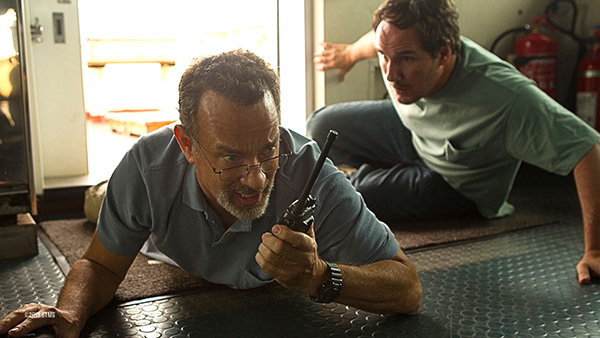
If you are only going to see one movie this weekend, or this year for that matter, “Captain Phillips” should be that movie.
Based on the harrowing true story, the film recounts the 2009 hijacking by Somali pirates of the U.S.-flagged MV Maersk Alabama off the coast of Somalia. Despite expertly and courageously dealing with the hijacking and protecting his crew, Captain Richard Phillips (Tom Hanks) is taken hostage in a lifeboat by the pirates and left floating at sea with them for days.
Few movies have achieved the sense of immediacy and realism present in this film and even fewer have been able to seamlessly blend drama and fact so well. “Captain Phillips” is masterfully crafted by director Paul Greengrass. Utilizing his signature semi-documentary style, Greengrass builds tension to nearly unbearable levels.
Audiences follow Hanks for the whole ride, and he who delivers a career-best performance. He brings an unparalleled tenderness to the role. Few moviegoers will ever be tested to the extremes of the film, but Hanks’s undying will to survive shines through in a way rarely captured so well on film. An Oscar nomination, and quite possibly a win, is in the bag for Hanks.
Newcomer Barkhad Abdi, who plays the leading Somali pirate Muse, also delivers an engrossing performance. Amplified not only by his total lack of previous acting experience but also by how obviously personal this story seems to be for him, Abdi’s performance evokes a heartbreaking piece of humanity. He plays Muse as a man who does not want to do bad things but does not know how to do anything else.
One of the most brilliant aspects of “Phillips” is the balance between how much we root for Phillips’ safety and how much we sympathize with Muse’s situation. This quality is due in large part to screenwriter Billy Ray’s excellent writing.
“Phillips” closes on one of the most beautiful scenes in recent film memory, resolving all of the built-up tension in an appropriate and satisfying ending. Most directors would have likely ended the film with the classic sentimental return home we’ve all become accustomed to, and expect from a film like this. Instead, without revealing the film’s masterful wrap-up, what we watch in “Captain Phillips” is pure emotional truth that will leave you speechless well into the credits. Greengrass and Hanks deserve Oscars for these five minutes alone.
A version of this article appeared in the Thursday, Oct. 10 print edition. Shawn Flanagan is a contributing writer. Email him [email protected].











































































































































